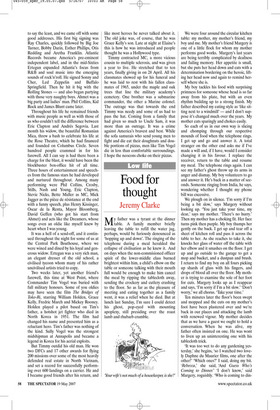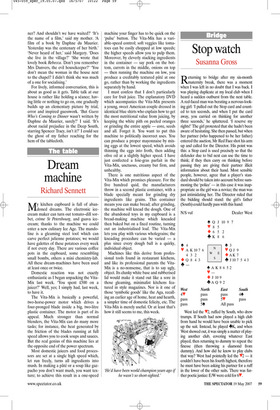Food for thought
Jeremy Clarke
My father was a tyrant at the dinner table. A family member briefly leaving the table to refill the water jug, perhaps, would be furiously denounced as ‘hopping up and down’. The ringing of the telephone during a meal heralded the collapse of civilisation as he knew it. And on days when the non-commisioned officer spirit of the lower-middle class burned brightest within him, a child’s elbow on the table or someone talking with their mouth full would be enough to make him cancel the meal by ripping the tablecloth away, sending the crockery and cutlery crashing to the floor. So as far as the pleasure of meeting and eating together as a family went, it was a relief when he died. But at lunch last Sunday, I’m sure I could detect his ghost, pop-eyed with mounting apoplexy, still presiding over the roast lamb and rhubarb crumble. We were four around the circular kitchen table: my mother, my mother’s friend, my boy and me. My mother’s friend Margery is one of a little flock for whom my mother performs good works. Margery’s last years are being terribly complicated by deafness and failing memory. Her appetite is small, but she puts her head down and eats with a determination bordering on the heroic, lifting her head now and again to remind herself where she is.
My boy tackles his food with surprising primness for someone whose head is so far away from his plate, but with an even rhythm building up to a strong finish. My father described my eating style as ‘like sitting next to a windmill’ — and I don’t suppose it’s changed much over the years. My mother eats sparingly and chokes easily.
So each of us in our own way is slicing and chomping through our respective mounds of food when the telephone rings. I get up and go and answer it. A total stranger on the other end asks me if I’ve made a will and, if I have, would I consider changing it in his favour. I replace the receiver, return to the table and resume my meal. The telephone rings again. I can see my father’s ghost throw up its arms in anger and dismay. My boy volunteers to go and answer it. He’s back in a matter of seconds. Someone ringing from India, he says, wondering whether I thought my phone bill was excessive.
We plough on in silence. ‘I’m sorry if I’m being a bit slow,’ says Margery without looking up. ‘You just take your time, my dear,’ says my mother. ‘There’s no hurry.’ Then my mother has a choking fit. Her face turns pink then purple. My boy thumps her gently on the back. I get up and tear off a sheet of kitchen roll and pass it across the table to her. As she reaches to take it, she knocks her glass of water off the table with her elbow and it smashes on the floor. I get up and go outside to the garage to get a mop and bucket, and a dustpan and brush. I return to find my boy on all fours picking up shards of glass with his fingers, and drops of blood all over the floor. My mother is trying to examine the sole of her foot for cuts. Margery looks up as I reappear and says, ‘I’m sorry if I’m a bit slow.’ ‘Don’t worry,’ we all chorus. ‘Take your time.’ Ten minutes later the floor’s been swept and mopped and the cuts on my mother’s foot have been plastered over and we’re back in our places and attacking the lamb with renewed vigour. My mother decides that as we have a guest we ought to hold a conversation. When he was alive, my father often insisted on one. He was wont to liven up an uninteresting one with his tablecloth trick.
‘It was too wet to do any gardening yesterday,’ she begins, ‘so I watched two lovely Daphne du Maurier films, one after the other!’ ‘Which ones?’ I said, doing my bit. ‘Rebecca,’ she said, ‘And Guess Who’s Coming to Dinner.’ ‘I don’t know,’ said Margery, roguishly. ‘Who is coming to din ner? And shouldn’t we have waited?’ ‘It’s the name of a film,’ said my mother. ‘A film of a book by Daphne du Maurier. Yesterday was the centenary of her birth.’ ‘Never heard of her,’ said Margery. ‘Does she live in the village?’ ‘She wrote that lovely book Rebecca. Don’t you remember Mrs Danvers, the evil housekeeper?’ ‘You don’t mean the woman in the house next to the chapel? I didn’t think she was much of a one for socialising.’ For lively, informed conversation, this is about as good as it gets. Table talk at our house is rather like holding a séance; having little or nothing to go on, one gradually builds up an elementary picture by trial, error and inspired guesswork. ‘But Guess Who’s Coming to Dinner wasn’t written by Daphne du Maurier, surely?’ I said. ‘It’s about racial prejudice in the Deep South, starring Spencer Tracy, isn’t it?’ I could see the ghost of my father reaching for the hem of the tablecloth.











































































 Previous page
Previous page